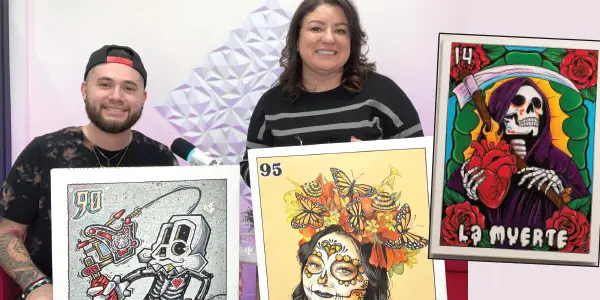
Dear Reader
In the light of The National Suicide Prevention Week, I would like to write this letter to you and your family. As a teenager who grew up in a latino family, my parents never really talked about mental health or suicide ideation with me. I understand that it was part of my culture that my parents believed that there were other ways of resolving mental health problems. Going to therapists was never an option because the truth was that they never believed that therapists could help a person.
It wasn’t until I lost an aunt by suicide that my family’s views on professional help and therapy changed. One day a Mexican mother arrived in my office and told me her story. No one in her family has ever talked about depression, suicide or how to ask for help. Therefore, she had this idea that she never needed to have this conversation with her kids. One day a tragedy knocked on her door changing her life forever. Her son was only 17 when he took his own life three weeks before Christmas. In his note he apologized to his mother and said that he just didn’t know how to ask for help. Sometimes individuals attempt suicide not so much because they want to die, but because they simply don’t know how to get help.
You see, to get to the point in which a person will attempt suicide, it usually means that this individual have been struggling with emotional pain and hurt, severe depression, and hopelessness. It means that this individual is unable to see any other way to find relief than ending their own life.
Raising awareness is not about sensationalizing suicide; it’s about acknowledging its existence and equipping ourselves with the tools to address it. Knowledge is a powerful tool in preventing suicide. By learning the warning signs and available resources, we can be better prepared to identify those who might be struggling and offer them the support they need. Furthermore, promoting open conversations about mental health reduces the stigma and encourages individuals to seek help without fear of judgment. These are just some of the warning signs if the individual is::
Text someone you love this week and ask: “How are you feeling? Como te sientes? And let these people know they can call or text 988, the Suicide & Crisis Lifeline, or text “HELLO” to 74174, the Crisis Text Line. If you or someone you know is struggling with suicidal thoughts or any of the symptoms in the box above, reach out to me, let’s chat!
Luciana Silva
“Espanta la oscuridad” – Una carta a todas las familias
Querido lector:
A la luz de la Semana Nacional de Prevención del Suicidio, me gustaría escribirle esta carta a usted y a su familia. Como adolescente que creció en una familia latina, mis padres nunca hablaron conmigo sobre salud mental o ideas suicidas. Entiendo que era parte de mi cultura que mis padres creían que había otras formas de resolver los problemas de salud mental. Acudir a terapeutas nunca fue una opción porque la verdad ellos nunca creyeron que los terapeutas pudieran ayudar a una persona.
No fue hasta que perdí a una tía por suicidio que las opiniones de mi familia sobre la ayuda y la terapia profesionales cambiaron. Un día llegó a mi oficina una madre mexicana y me contó su historia. Nadie en su familia ha hablado nunca de depresión, suicidio o de cómo pedir ayuda. Por lo tanto, tuvo la idea de que nunca necesitaba tener esta conversación con sus hijos. Un día una tragedia llamó a su puerta cambiando su vida para siempre. Su hijo tenía sólo 17 años cuando se quitó la vida tres semanas antes de Navidad. En su nota se disculpaba con su madre y decía que simplemente no sabía cómo pedir ayuda. A veces las personas intentan suicidarse no tanto porque quieran morir sino porque simplemente no saben cómo conseguir ayuda.
Verá, llegar al punto en el que una persona intenta suicidarse, generalmente significa que esta persona ha estado luchando contra dolor emocional, depresión severa y desesperanza. Significa que este individuo no ve otra forma de encontrar alivio que acabar con su propia vida.
Crear conciencia no se trata de sensacionalizar el suicidio; se trata de reconocer su existencia y equiparnos con las herramientas para hablar de ello. El conocimiento es una herramienta poderosa para prevenir el suicidio. Al conocer las señales de advertencia y los recursos disponibles, podemos estar mejor preparados para identificar a quienes podrían tener dificultades y ofrecerles el apoyo que necesitan. Además, promover conversaciones abiertas sobre salud mental reduce el estigma y anima a las personas a buscar ayuda sin temor a ser juzgadas. Estas son sólo algunas de las señales de advertencia si el individuo está:
Envíe un mensaje de texto a alguien que amas esta semana y pregúntale: “¿Cómo te sientes?” Y hazle saber a estas personas que pueden llamar o enviar un mensaje de texto al 988, Suicide & Crisis Lifeline, o enviar un mensaje de texto con la palabra “HOLA” al 74174, la Crisis Text Line. Si usted o alguien que conoce está luchando contra pensamientos suicidas o cualquiera de los síntomas en el cuadro anterior, comuníquese conmigo, ¡charlemos!
Luciana Silva









